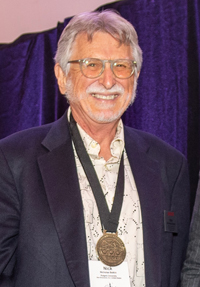 Since earning his Master of Librarianship at the University of Washington in 1970, Nicholas Belkin has had a distinguished career as one of the leading scholars in the field of information science. The Association for Information Science & Technology (ASIS&T) recently recognized him for it with its inaugural ASIS&T Fellow Award.
Since earning his Master of Librarianship at the University of Washington in 1970, Nicholas Belkin has had a distinguished career as one of the leading scholars in the field of information science. The Association for Information Science & Technology (ASIS&T) recently recognized him for it with its inaugural ASIS&T Fellow Award.
The award recognizes individuals who have made substantial and sustained contributions to ASIS&T and the broader field of information science. A longtime professor at Rutgers University, Belkin has authored or co-authored more than 200 journal articles, conference proceedings and book chapters. He was the co-author of one of the first books to investigate interactive information retrieval, and his work involving “cognitive viewpoint” has been a pillar of information science, guiding scholars and practitioners in the field for decades.
“I'm extremely honored to have been the initial recipient of this new award of the ASIS&T,” Belkin said. “This has been my professional home organization since I first became a student member while studying for my M.Lib. at UW.”
Belkin has had a profound influence on Chirag Shah, a professor in the Information School who nominated him for the award. “Both as a computer science and an information science student, I found his theories instrumental for my research in information retrieval,” Shah said.
After earning his M.Lib., Belkin went on to earn his Ph.D. in Information Studies from the University of London (University College). In addition to his appointment at Rutgers, he has held visiting positions around the world, including at the UW iSchool. He is now a distinguished professor of information science emeritus at Rutgers, where his current research focuses on the ubiquity of information in daily life and the implications of that on library and information science.
“I hope that my efforts in trying to ensure that people, and people's needs and goals, are central to the design and conduct of information systems, will continue to be influential, especially with respect to how generative AI and large language models are applied to such systems,” he said.
Belkin has remained a close collaborator with Shah, who has invited him to speak in many of his classes.
“The UW and the iSchool are very fortunate to have such a shining star as an alum who has created deep, meaningful impacts on hundreds of scholars and thousands of students over many decades across multiple continents,” Shah said.